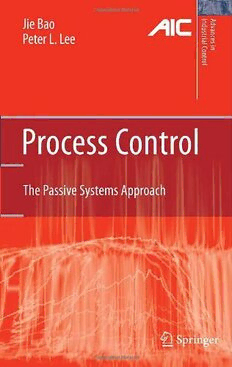Download Process control: the passive systems approach PDF Free - Full Version
Download Process control: the passive systems approach by Jie Bao, Peter L. Lee in PDF format completely FREE. No registration required, no payment needed. Get instant access to this valuable resource on PDFdrive.to!
About Process control: the passive systems approach
Process Control introduces an emerging area in process control - control system analysis and design based on the concept of passive systems. Passive systems are a class of processes that dissipate certain types of physical or virtual energy, defined by Lyapunov-like functions. Passivity and associated stability conditions form one of the cornerstones in control theory and have recently begun to be applied in process control. Defined as an input-output property, the concept of passivity implies stability conditions for interconnected systems. Passive systems are minimum phase and thus very easy to control via output feedback, even if they are highly nonlinear and coupled. Therefore, the passivity framework can be used in process input-output controllability analysis as well as control design. Here, the concept of passive systems is also linked to process thermodynamics to provide process engineers with insights into the physical bases of the above results.In this book, passivity-based developments in the areas of robust process control, decentralized control, fault tolerant control, process controllability analysis and nonlinear process control are addressed systematically for the first time. Written for the industrial, engineering and academic communities, the emphasis is placed on results that enhance insight and intuition. Application issues are illustrated by case studies in all the main chapters. MATLABВR routines for selected examples and a library of functions that implement the system analysis and control design methods developed in Process Control can be downloaded from springer.com. This book presents the reader with both theconceptual framework and practical tools for passivity-based system analysis and control.
Detailed Information
| Author: | Jie Bao, Peter L. Lee |
|---|---|
| Publication Year: | 2007 |
| Pages: | 269 |
| Language: | English |
| File Size: | 2.764 |
| Format: | |
| Price: | FREE |
Safe & Secure Download - No registration required
Why Choose PDFdrive for Your Free Process control: the passive systems approach Download?
- 100% Free: No hidden fees or subscriptions required for one book every day.
- No Registration: Immediate access is available without creating accounts for one book every day.
- Safe and Secure: Clean downloads without malware or viruses
- Multiple Formats: PDF, MOBI, Mpub,... optimized for all devices
- Educational Resource: Supporting knowledge sharing and learning
Frequently Asked Questions
Is it really free to download Process control: the passive systems approach PDF?
Yes, on https://PDFdrive.to you can download Process control: the passive systems approach by Jie Bao, Peter L. Lee completely free. We don't require any payment, subscription, or registration to access this PDF file. For 3 books every day.
How can I read Process control: the passive systems approach on my mobile device?
After downloading Process control: the passive systems approach PDF, you can open it with any PDF reader app on your phone or tablet. We recommend using Adobe Acrobat Reader, Apple Books, or Google Play Books for the best reading experience.
Is this the full version of Process control: the passive systems approach?
Yes, this is the complete PDF version of Process control: the passive systems approach by Jie Bao, Peter L. Lee. You will be able to read the entire content as in the printed version without missing any pages.
Is it legal to download Process control: the passive systems approach PDF for free?
https://PDFdrive.to provides links to free educational resources available online. We do not store any files on our servers. Please be aware of copyright laws in your country before downloading.
The materials shared are intended for research, educational, and personal use in accordance with fair use principles.

